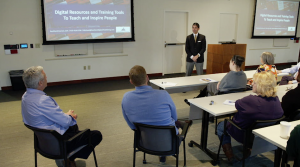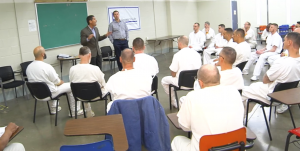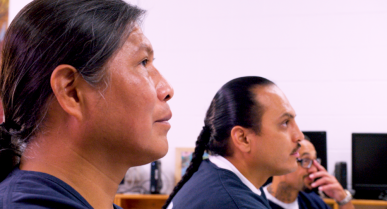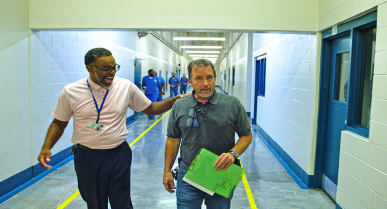He Spent a Quarter of a Century in Prison—See Why He Visited MTC’s Corporate Office
President of MTC, Scott Marquardt, welcomed Michael Santos to the corporate office. Michael was invited to share his personal story of struggle and triumph.
“For me, ” began Michael, “I want to say first of all, thanks for all that you do. I know that it’s a very heavy lift to be motivating and inspiring people who are living in prison who are living without hope.”
Michael says that was him back in 1987 when he was convicted of felony drug crimes.
“I was facing a sentence of life without parole, he told a room full of MTC staff, “I didn’t know what that meant, because I had never been incarcerated before.”
He ended up serving 26 years. Today, he’s a successful entrepreneur and director of a program called Resilient Courses. He’s on a mission to empower people in prison.
“If we can help people in prison believe that they can do something more, then I think we all achieve our objectives.”
Michael is an advocate for rehabilitation programs in prison and is grateful for companies like MTC that are committed to helping people in difficult situations change their lives. Michael actually served time at the Taft facility in California, which MTC currently operates for the Bureau of Prisons.
“And what we have to do is have more of this: Believe It or Not I Care, this message that I think MTC really [embodies].”
Despite the false information spread by special interest groups about private prison, Michael says the private sector has a valuable role to play in corrections.
 “I’m a big believer that in America, we should pursue excellence, and I believe that the private sector is far better positioned to pursue excellence.”
“I’m a big believer that in America, we should pursue excellence, and I believe that the private sector is far better positioned to pursue excellence.”
He says the bottom line is investing in programs and staff who truly want to help and measure success.
“It’s how ready are the people that come out of that institution to function as law-abiding, contributing citizens. And if the private sector can do it—I’m 100 percent supportive of that.”
Michael recently toured several MTC correctional facilities, and says he’s convinced MTC is in corrections for the right reasons.
“What I saw in those institutions is something I did not see in a public institution: that was people learning skillsets that will result in self-directed employment when they come home.”











